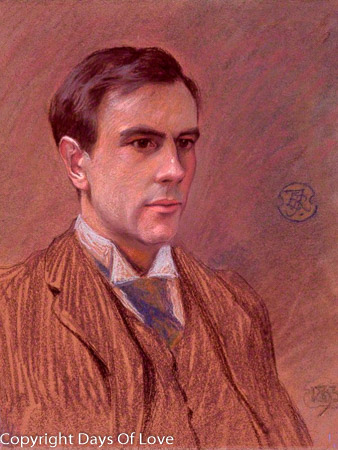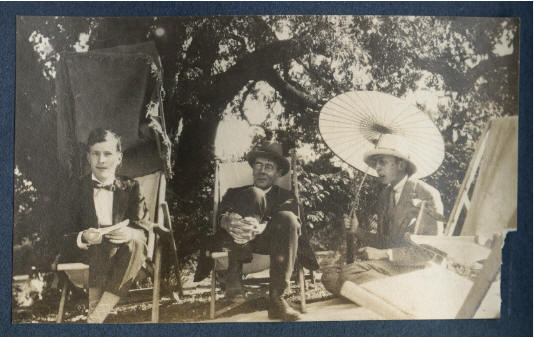Queer Places:
Charterhouse School, Charterhouse Rd, Godalming GU7 2DX, Regno Unito
1 All Souls' Pl, Marylebone, London W1B 3DA, Regno Unito
11 Edwardes Square, Kensington, London W8 6HE, Regno Unito
13 Hanover Terrace, Marylebone, London NW1 4RJ, Regno Unito
Spring Cottage, 99 Church Rd, London W7, Regno Unito
Golders Green Crematorium, 62 Hoop Ln, London NW11 7NL, Regno Unito
 Goldsworthy
Lowes Dickinson (6 August 1862 – 3 August 1932), known as Goldie,[1]
was a British political scientist[2]
and philosopher. He lived most of his life at Cambridge, where he wrote a
dissertation on Neoplatonism before becoming a fellow. He was closely
associated with the Bloomsbury Group. He was part of the
Cambridge Apostles.
Goldsworthy Lowes Dickinson
had a satisfactory succession of young friends:
Roger Fry,
Ferdinand Schiller,
Oscar Eckhard,
Peter Savary, and others. One of
his friends writes that "each of us did his best in hi own way to assuage
Goldie's physical desires. His relationship with each ripened, after the
passion had subsided, into a lasting friendship."
Goldsworthy
Lowes Dickinson (6 August 1862 – 3 August 1932), known as Goldie,[1]
was a British political scientist[2]
and philosopher. He lived most of his life at Cambridge, where he wrote a
dissertation on Neoplatonism before becoming a fellow. He was closely
associated with the Bloomsbury Group. He was part of the
Cambridge Apostles.
Goldsworthy Lowes Dickinson
had a satisfactory succession of young friends:
Roger Fry,
Ferdinand Schiller,
Oscar Eckhard,
Peter Savary, and others. One of
his friends writes that "each of us did his best in hi own way to assuage
Goldie's physical desires. His relationship with each ripened, after the
passion had subsided, into a lasting friendship."
Dickinson was deeply distressed by Britain's involvement in the First World
War. Within a fortnight of the war's breaking out he drew up the idea of a
League of Nations, and his subsequent writings helped to shape public opinion
towards the creation of the League.
Dickinson was born in London, the son of Lowes Cato Dickinson (1819–1908),
a portrait painter, by his marriage to Margaret Ellen Williams, a daughter of
William Smith Williams who was literary advisor to Smith, Elder & Company and
had discovered Charlotte Brontë. When the boy was about one year old his
family moved to the Spring Cottage in Hanwell, then a country village. The
family also included his brother, Arthur, three years older, an older sister,
May, and two younger sisters, Hester and Janet.
His education included attendance at a day school in Somerset Street,
Portman Square, when he was ten or eleven. At about the age of twelve he was
sent to Beomonds, a boarding school in Chertsey, and his teenage years from 14
to 19 were spent at Charterhouse School in Godalming, where his brother Arthur
had preceded him. He was unhappy at Charterhouse, although he enjoyed seeing
plays put on by visiting actors, and he played the violin in the school
orchestra. While he was there, his family moved from Hanwell to a house behind
All Souls Church in Langham Place.

by Roger Fry

Philip Charles Thomson Ritchie; Goldsworthy Lowes Dickinson; Edward ('Eddy') Sackville-West
by Lady Ottoline Morrell
vintage snapshot print, 1922
2 1/8 in. x 3 1/2 in. (55 mm x 90 mm) image size
Purchased with help from the Friends of the National Libraries and the Dame Helen Gardner Bequest, 2003
Photographs Collection
NPG Ax141361
In 1881 Dickinson went up to King's College, Cambridge, as an exhibitioner,
where his brother, Arthur, had again preceded him. Near the end of his first
year he received a telegram informing him that his mother had died from
asthma. During his college years, his tutor,
Oscar Browning, was
a strong influence on him, and Dickinson became a close friend of his fellow
King's undergraduate
C. R.
Ashbee. Dickinson won the chancellor's English medal in 1884 for a poem on
Savonarola, and in graduating that summer he was awarded a first-class degree
in the Classical Tripos.[3]
After travelling in the Netherlands and Germany, Dickinson returned to
Cambridge late that year and was elected to the Cambridge Conversazione
Society, better known as the Cambridge Apostles. In a year or two he was part
of the circle that included Roger
Fry, J. M. E. McTaggart, and Nathaniel Wedd.
In the summer of 1885 he worked at a co-operative farm, Craig Farm at
Tilford near Farnham in Surrey. The farm had been started by Harold Cox as an
experiment in simple living. Dickinson was proud of his hoeing, digging, and
ploughing. That autumn, and continuing to the spring of 1886, Dickinson joined
the University Extension Scheme to give public lectures that covered
Carlyle, Emerson, Browning, and Tennyson. He toured the country, living
for a term at Mansfield and for a second term at Chester and Southport. He
spent a brief time in Wales afterwards.
With financial help from his father, Dickinson then began to study for a
medical degree, beginning in October 1886 at Cambridge. Although he became
dissatisfied with his new subject and nearly decided to drop out, he
persevered and passed his M.B. examinations in 1887 and 1888. Yet he finally
decided he was not interested in a career in medicine.
In March 1887 a dissertation on Plotinus helped his election to a
fellowship at King's College. During
Roger Fry's last year at
Cambridge (1887–1888), Dickinson, a homosexual,[4]
fell in love with him. After an initially intense relationship (which
according to Dickinson's biography did not include sex with Fry, a
heterosexual), the two established a long friendship. Through Fry, Dickinson
soon met Jack McTaggart and
Ferdinand Schiller.
At the time of the Oscar Wilde
trials Ferdinand Schiller wrote a letter to his beloved Goldsworthy Lowes
Dickinson, beginning: ‘My … (mustn’t use the words since the Oscar Wilde
trial).’
Dickinson then settled down at Cambridge, although he again lectured
through the University Extension Scheme, travelling to Newcastle, Leicester,
and Norwich. His fellowship at King's College (as an historian) was
permanently renewed in 1896. That year his book The Greek View of Life
was published. He later wrote a number of dialogues in the Socratic tradition.
Dickinson did not live the detached life of a stereotypical Cambridge
professor. When G. K. Chesterton chose contemporary thinkers with whom he
disagreed for his book Heretics (1905), the focus of Chapter 12 was
"Paganism and Mr. Lowes Dickinson". There Chesterton writes:
Mr. Lowes Dickinson, the most pregnant and provocative of recent
writers on this and similar subjects, is far too solid a man to have
fallen into this old error of the mere anarchy of Paganism. To make hay of
that Hellenic enthusiasm which has as its ideal mere appetite and egotism,
it is not necessary to know much philosophy, but merely to know a little
Greek. Mr. Lowes Dickinson knows a great deal of philosophy, and also a
great deal of Greek, and his error, if error he has, is not that of the
crude hedonist. But the contrast which he offers between Christianity and
Paganism in the matter of moral ideals—a contrast which he states very
ably in a paper called "How Long Halt Ye?" which appeared in the
Independent Review—does, I think, contain an error of a deeper kind.
Dickinson was a lecturer in political science from 1886 to his retirement
in 1920, and the college librarian from 1893 to 1896. Dickinson helped
establish the Economics and Politics Tripos and taught political science
within the University. For 15 years he also lectured at the London School of
Economics.[5]
In 1897 he made his first trip to Greece, travelling with Nathaniel Wedd,
Robin Mayor, and A. M. Daniel.
He joined the Society for Psychical Research in 1890, and served on its
Council from 1904 to 1920.
In 1903 he helped to found the Independent Review. Edward Jenks was
editor, and members of its editorial board included Dickinson, F. W. Hirst, C.
F. G. Masterman, G. M. Trevelyan, and Nathaniel Wedd. Fry designed the front
cover. Over the years Dickinson contributed a number of articles to it, some
later reprinted in Religion: A Criticism and a Forecast (1905) and
Religion and Immortality (1911).
Within a fortnight of the start of the First World War, Dickinson had
drafted schemes for a "League of Nations", and together with Lord Dickinson
and Lord Bryce he planned the ideas behind of the League of Nations and played
a leading role in the founding of the group of internationalist pacifists
known as the Bryce Group. The organisation eventually became the nucleus of
the League of Nations Union. In his pamphlet After the War (1915) he
wrote of his "League of Peace" as being essentially an organisation for
arbitration and conciliation. He felt that the secret diplomacy of the early
twentieth century had brought about war and thus could write that, "the
impossibility of war, I believe, would be increased in proportion as the
issues of foreign policy should be known to and controlled by public opinion."[6]
Dickinson promoted his ideas with a large number of books and pamphlets,
including his book The International Anarchy.[5]
He also attended a pacifist conference in The Hague in 1915, and in 1916 he
set off on a lecture tour of the United States promoting the idea of a League
of Nations.
In 1929 the Talks Department of the BBC invited him to give the first and
last lectures in a series called "Points of View". He went on to give several
series of BBC talks on various topics, including Goethe and Plato.
After a prostate operation in 1932, Dickinson appeared to be recovering,
but he died on 3 August. Memorial services were held in King's College Chapel,
Cambridge, and in London.
E.
M. Forster, by then a good friend, who had been influenced by Dickinson's
books, accepted the appointment as Dickinson's literary executor. Dickinson's
sisters then asked Forster to write their brother's biography, which was
published as Goldsworthy Lowes Dickinson in 1934. Forster has been
criticised for refraining from publishing details of Dickinson's sexual
proclivities, including his foot fetishism and unrequited love for young men.[7]
E. M. Forster stated (in "the Art of Fiction") that he used Dickinsons'
sisters as his inspiration for Margaret and Helen Schlegel, the central
characters in Howards End.
My published books:


BACK TO HOME PAGE

- https://en.wikipedia.org/wiki/Goldsworthy_Lowes_Dickinson
- Woods, Gregory. Homintern . Yale University Press. Edizione del
Kindle.
- Homosexuals in History, A Study of Ambivalence in Society, Literature
and the Arts, by A.L. Rowse, 1977
 Goldsworthy
Lowes Dickinson (6 August 1862 – 3 August 1932), known as Goldie,[1]
was a British political scientist[2]
and philosopher. He lived most of his life at Cambridge, where he wrote a
dissertation on Neoplatonism before becoming a fellow. He was closely
associated with the Bloomsbury Group. He was part of the
Cambridge Apostles.
Goldsworthy Lowes Dickinson
had a satisfactory succession of young friends:
Roger Fry,
Ferdinand Schiller,
Oscar Eckhard,
Peter Savary, and others. One of
his friends writes that "each of us did his best in hi own way to assuage
Goldie's physical desires. His relationship with each ripened, after the
passion had subsided, into a lasting friendship."
Goldsworthy
Lowes Dickinson (6 August 1862 – 3 August 1932), known as Goldie,[1]
was a British political scientist[2]
and philosopher. He lived most of his life at Cambridge, where he wrote a
dissertation on Neoplatonism before becoming a fellow. He was closely
associated with the Bloomsbury Group. He was part of the
Cambridge Apostles.
Goldsworthy Lowes Dickinson
had a satisfactory succession of young friends:
Roger Fry,
Ferdinand Schiller,
Oscar Eckhard,
Peter Savary, and others. One of
his friends writes that "each of us did his best in hi own way to assuage
Goldie's physical desires. His relationship with each ripened, after the
passion had subsided, into a lasting friendship."

